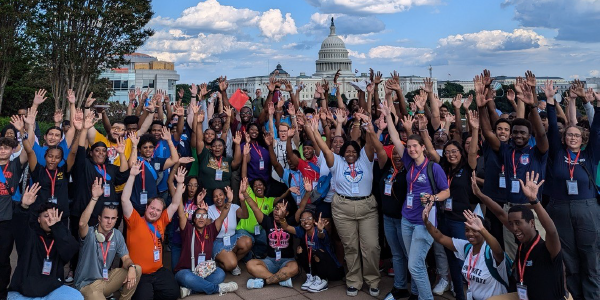Created as part of President Lyndon B. Johnson’s Economic Opportunity Act in 1964, Job Corps marks its 60th anniversary this month.
As one of the largest residential career training programs in the nation, Job Corps supports over 35,000 students at more than 120 centers across the country training in vital industries like health care, IT, construction, and manufacturing.
Since 1964, Job Corps has been built on the idea that good jobs change lives! We’re celebrating the more than 3 million students who have discovered their path toward a brighter future through Job Corps.
This celebration marks a new era for Job Corps, as we work to build a more modern program that meets the needs of today’s youth and young adults and the evolving workforce. We’re making sure Job Corps works for our students first, and we are improving the student experience by updating policies, improving technology and leveraging key partnerships.
Job Corps 2.0. is our vision for the future. It’s a road map to transform how we operate, as we transition the program to a student-centric model informed by youth voice. We will operate our program with young people’s highest potential in mind, as opposed to their greatest challenges or worst moments. We maintain our mission of creating equitable access, with an increased emphasis on inclusivity to ensure our students are at the table as we do this work.
At its heart, this new vision for the program is rooted in the belief that it’s our role to provide a safe, effective and supportive environment for our students to realize their potential. We provide a pathway for them to grow, gain the skills they need to succeed and get good jobs that lead to brighter futures.
We can’t build these career pathways on our own, though. Partnership is what makes our machine run. We’re thankful to employer partners across the country – partners like the Department of the Navy’s Naval Sea Systems Command, Disney Culinary Program and Johnson & Johnson – who work with us to provide our students real-world, hands-on training and employment opportunities upon graduation. Just as important are the local trade unions, community partners and smaller local businesses that join with Job Corps centers in communities across the country to build their own local talent pipeline.
Good jobs change lives. With Job Corps 2.0, we will help students forge paths to self-sufficiency, dignity and respect, and good jobs.
I’m proud to work with Job Corps, a program that sees diversity as a strength, celebrates our differences and provides multiple pathways for young people to flourish.
Careers begin here. Connections begin here. Opportunity begins here at Job Corps.
Here’s to our next 60 years—and beyond!
Erin McGee is the acting national director of Job Corps.



